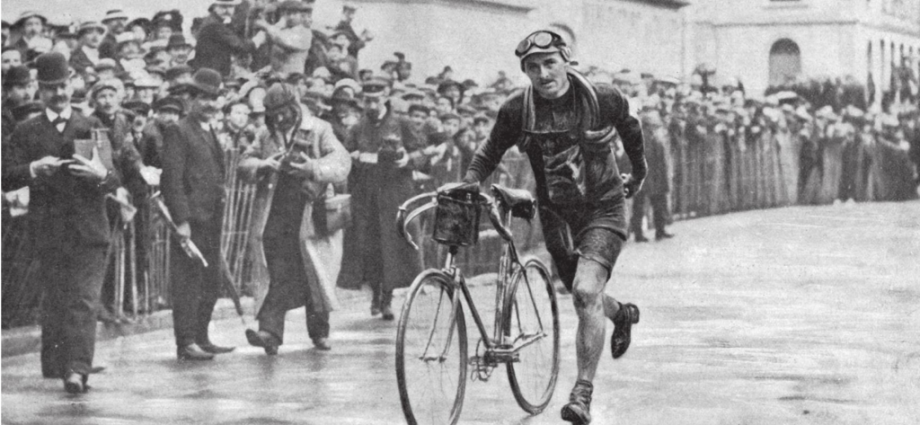Francois Faber was a Luxemburgian cyclist racing as professional between 1906 and 1914. His nickname was “Le Géant de Colombes” [The Giant of Colombes] due to his height (1.86 m /6.1 ft) and the Parisian suburb where he came from. Although he was born and raised in France, officially, he was the first non-French winner of the Tour de France.
The seventh Tour de France between 5 July and 11 August in 1909 was marred by terrible weather. The previous edition was won by Lucien Petit-Breton, one of the best cyclists in the pre-war era, but the rising star of the cycling world was the 21-year-old Faber, who won 4 stages and managed to finish the race on 2nd place behind the “l’elegant Argentin”. But probably nobody thaught that Faber would be that strong next year, that the organizers asked him to calm down after 5 consecutive stage wins, in order to keep the race exciting. Nevertheless, he won the general classification (calculated on points those days).
On the extraordinary rainy 1st stage, he missed the sprint against the Belgian Cyrille van Hauwaert, but two days later, on the 398 km long 2nd stage he managed to finish a 200 km long solo break. One of the most iconic images of the pre-war period of cycling is when Faber crossed the finish line running beside his bicycle because its chain was broken. This happened on the 3rd étape, on a very cold day.
The weather showed also no mercy in the next few days, especially the 5th stage proved to be the most terrible. The cyclists had to ride a 311 km long route between Lyon and Grenoble, the major ascents of the stage were the Les Echelles and the Col de Porte. In the mountains, Faber was blown off the road by the strong wind, later he was knocked down by a horse. But he still managed to win the stage with a five-minute margin.
At the finish line of the 6th stage in Nice on 15 July 1909, 20 000 cycling fans gathered to see him winning his fifth victory in a row. A record that still stands after more than a century.
Faber won several stages also in the following years and triumphed at some of the biggest one-day races those days, like Paris-Tours (1910), Bordeaux-Paris (1911) and Paris-Roubax (1913).
After the ww1 broke out, he joined the French Foreign Legion. He died on the battlefield on 9th May 1915.
